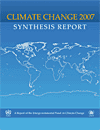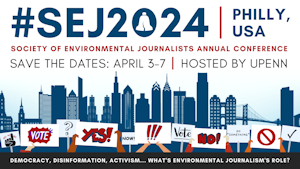SEJournal Online is the digital news magazine of the Society of Environmental Journalists. Learn more about SEJournal Online, including submission, subscription and advertising information.
The IPCC: A guide for journalists
Basics
The Intergovernmental Panel on Climate Change — or IPCC, as it is commonly known — was established by the World Meteorological Organization and United Nations Environment Programme in 1988 to assess and summarize scientific research about man-made climate change ("anthropogenic global warming").
The IPCC does not itself commission or conduct research, but analyzes and weighs findings by scientists in many nations. It describes itself as the "leading body for the assessment of climate change," with a mission "to provide the world with a clear, balanced view of the present state of understanding of climate change."
Nobel Peace Prize
On October 12, 2007, the Nobel Peace Prize was awarded to the IPCC and former Vice President Al Gore "for their efforts to build up and disseminate greater knowledge about man-made climate change, and to lay the foundations for the measures that are needed to counteract such change."
2007 Reports
 |
- Synthesis Report: media advisory
- AR4 Synthesis Report
The first three parts were produced by three "working groups" organized to look at different aspects of climate change:
- Working Group I assessed scientific findings about the climate system itself, summarizing the state of researchers' knowledge about changes that have occurred and are projected to occur.
- Working Group II analyzed observations of climate-change impacts on natural and human systems and projected future changes. It also discussed vulnerabilities and possibilities for adapting to climate change.
- Working Group III focused on mitigation — opportunities for actions to reduce greenhouse gas emissions that could limit man-made change and reduce its impacts.
Before the IPCC's four-part 2007 report — formally titled, its Fourth Assessment Report — three earlier assessment reports, also summarizing climate-change research, were published in 1990 (with a supplement in 1992), 1995 and 2001.
The Fourth Assessment Report was the product of work by hundreds of scientists from more than 130 nations. The IPCC says there were more than 450 lead authors, more than 800 contributing authors, and more than 2,500 expert reviewers.
Already Outdated
Research on climate change is a continuing process, so the IPCC in each assessment report considers findings published and other data submitted before a certain time. The Fourth Assessment Report's cut-off date was in December 2005. This feature of the IPCC process means any assessment report is at least somewhat out-of-date by the time it is issued.
In the case of the 2007 report, for example, the New York Times reported that some scientists believed projections of sea-level rise were probably wrong because the IPCC authors had to leave out "a growing body of data on melting glaciers and inland ice sheets."
More Information
For details on the three working groups' reports, see these SEJ web pages:
- Working Group I: "The Physical Science Basis"
- Working Group II: "Impacts, Adaptation and Vulnerability"
- Working Group III: "Mitigation of Climate Change"
- IPCC terminology about certainty
















